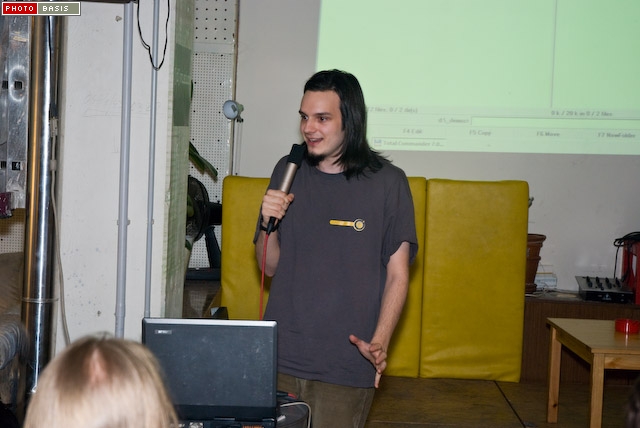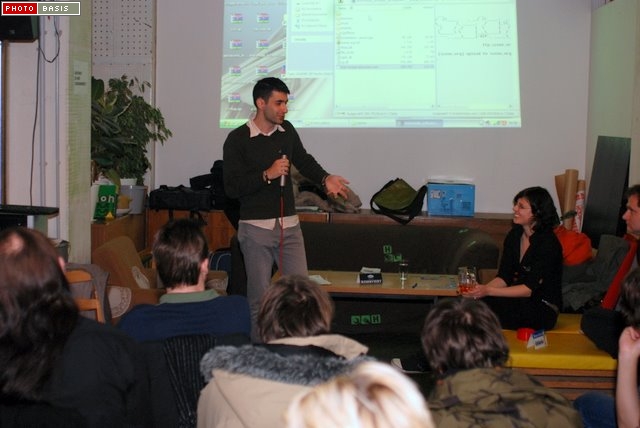|
by Gina and rip of [d]vision and Axel of Brainstorm
|
Download PDF version: 
"One of the reasons why the demo group Conspiracy was founded was the intro `Sunspot´ which was released at MEKKA & Symposium 2002 in Germany," said BoyC at the 3rd Vienna Demoscene Meeting 0011. This production by Digital Dynamite has been made possible by [d]vision member Ronin, who assisted BoyC by lending his PC. Special greetings in this intro included the association [d]vision, fans of the Demoscene since their first media culture festival in Vienna 2000. Vice versa members of the Austrian demogroup Speckdrumm and others recently joined the core team of [d]vision. That's how it all started.
A bit of history
[d]vision is a platform, a festival, and an archive for digital culture located in Vienna, Austria, right in the heart of Europe. It was established as a project of media and film theory students in 2000. Organising events on different aspects of digital and media culture throughout the year is the main purpose of [d]vision. The first [d]vision festival was a media art festival named after its organising association, [d]vision. With the event "Electronic Kindergarten", in 2001 we at [[d]vision focused on game culture and the creative do-it-yourself culture with its phreaks, nerds and geeks.
"[d]vision is a platform, a festival, and an
archive for digital culture in Vienna"
|
Deriving from the root of all digital communities, the international Demoscene has been honoured with special presentations. Through a theoretical media and games perspective, the festival did not just offer the chance to play old video games on their original machines but also portrayed, publicly, lesser-known dimensions of digital culture like the Demoscene.

Gina introducing BoyC of Conspiracy
Other [d]vision projects such as the participation in the Kiev International Media Art Festival 2001 or the [d]vision festival digitalBIEDERMEIER Vienna 2002 focused on topics like "public and privacy", "misinformation", and "counter-public spheres within digital subcultures". This early period of the culture platform [d]vision was interrupted, as its founder Mirko Tobias Schaefer moved to the University of Utrecht, Netherlands as a junior teacher. With project leader and driving force Regina "Gina" Webhofer joining in 2007, [d]vision is now concentrating only on the root culture Demoscene and therefore exploring the media void.

Gargaj of Conspiracy holding his speech
Financing the project
The Demoscene Project is financially supported by the City of Vienna and by Museumsquartier. The digital culture scene in Vienna has developed a unique funding system for digital culture, called netznetz. Unlike the usual application procedures in artistic and cultural fields, where office workers of a cultural department award a certain amount of money to an institution, to a group of artists or for realising a project, in netznetz the community of digital culture itself distributes the money provided by the City of Vienna. Without a certain budget, we can not realise our Demoscene Project, so [d]vision took up the challenge to participate in the netznetz application competition. Besides writing a project proposal, we had to present our project to the community of digital culture in Vienna, which then voted for our project. In this way, we got a budget which allows us to pay the travelling costs for our Demoscene guests, who hold speeches and demoshows at the Vienna Demoscene Meetings, and to cover the material and printing costs - e.g. for the [d]vision postcards. Thereby we invite our Demoscene guest to choose his/her favourite screenshot, which is the front side of the postcard released at Vienna Demoscene Meetings.

Navis during his presentation at werkzeugH
However, there is far from enough money to pay any salary to [d]vision members for organising this event. All the work is done by [d]visionaries for free, in their spare time. Besides the fact that we love demos and the Demoscene, we attempt to provide really interesting content in a nice atmosphere so that we simply spend good time together with our audience. Another secret of our success, are the relations the team has set up with the community of digital culture in Vienna. The community really appreciates what we are doing, and several groups are interested to cooperate with us. For this reason, we can use space without paying rent (e.g. werkzeugH, exhibition space in Museumsquartier), partners invite us to participate in their projects (e.g. screening demos on a huge outdoor screen), and important institutions of contemporary art provide office space to us for free, as has happened recently.
"The Demoscene Project is financially supported
by the City of Vienna"
|
On February 7th, we had the opening party of the new [d]vision office space in Museumsquartier (called d-Raum), where we use the opportunity to screen demos in cooperation with the Scene.org awards, making people aware of the chance to vote for their favourite demo production in the category "public choice". So we cooperate with different partners, and in this way we create win-win situations for all.
The [d]vision vision
The name [d]vision is not chosen by coincidence. All [d]vision projects are based on a strong vision. They are known as "quality" events, organised with low-budget but a huge amount of enthusiasm, confronting a "brother" audience with topics related to digital culture, which have not been discussed in public before. Also the Demoscene Project started as, and is carried out by, a vision to support the Demoscene through those opportunities we have here in Vienna. Right now, we put all our efforts in organising the Vienna Demoscene Meetings and the Demoscene Event [July2008] in the best way we can.
"The digital culture community really
appreciates what we are doing"
|
The guests so far
Up until now, guests at the meetings had very positive feedback. The first speaker was Kostas Pataridis, better known as Navis of Andromeda Software Development.
"Gina of [d]vision invited me over to Austria in November," remembers Navis, when he thinks back to how it all started. "I knew Gina from a long time ago, from Assembly 2005, I think, since she was part of our gang there. She also interviewed me back then for her thesis on the Demoscene. I knew that Gina would do a very good job organising this. On the day of the event, we went in the morning for an interview with a radio station, of which I can't remember the name right now, where I was asked interesting questions about history and aesthetics, about my role, why real-time is different than offsite rendering; that sort of stuff. In the evening I had to give a presentation, which I didn't have written, so I was improvising without notes or slides. I thought it would be easier and more relaxed this way. And I was right. I talked through the history of the Demoscene, the way I witnessed it myself in ASD (since 1992), showed some demos - "eye candies" and "eye cancers" - but tried to make it so that people would appreciate both kinds of demos. So they enjoyed, for example, "The Popular Demo" and "Chimera". There were lots of questions asked, some of them quite technical. I must say that it was a very cold night, it was heavily snowing, and yet the attendance was high. We spent the rest of the night drinking and moving from one club to another. Vienna truly is a Bohemian city. To conclude: I think it was very well arranged, the location is just perfect, and relaxed. As for the [d]vision guys, I think that they know what they are doing, and I'm looking forward to the summer when they'll stage this thing at the museum. I hope I can make it, too."
Navis was followed by Gergely "Gargaj" Szelei, of the groups Ümlaüt Design and Conspiracy, a few weeks later. The the versatile Hungarian, who has an affinity to programming, music, and even graphics, was born in 1983 in Miskolc. In his speech he discussed his motivations behind creating demos.
Guests who followed included Barna "BoyC" Buza of Conspiracy, who talked about 64k intros, and Dipswitch from Germany, who gave a presentation about the Bulletin Board Systems (BBSes) of the early 1990s and their importance in the Demoscene.
Overall it's easy to see that [d]vision and the organized Demoscene meetings are some of the most important outreach projects the Demoscene has ever undertaken in Austria. It will be interesting to see what future projects will stem from these initiatives. ZINE will report about future endeavours of the [d]vision crew and wishes them all the best of luck, particularly with regard to the big exhibition this summer.
Fore more information, please visit http://www.dvision.at
Go back to articlelist |

